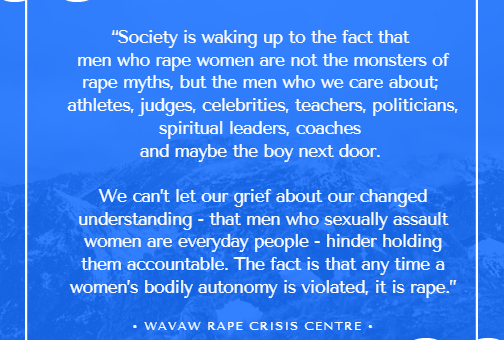
“Why Don’t Women Report?”: Asking the wrong questions
Whenever WAVAW receives a call from the media about a story on sexual assault, we are always expecting the same question: “Why don’t women report?” We are asked this question so often that we have developed all kinds of ways to bridge the conversation to what we really want to talk about: Why sexualized violence is happening and what we can do about it.
The latest news about high profile charges of sexualized violence has centered on a police officer who was in breach of trust. This time, no one has called to ask us why women don’t report. In fact, no one is asking us anything at all. Living in a rape culture has groomed us to believe that sexual assault is inevitable and victims/women are to blame for not behaving ‘perfectly’. We are taught that sexualized violence is something we can ‘save’ women from if we just catch a few bad guys. We have been coaxed out of paying attention to the larger, more insidious ways these ideas are upheld in the corporate and public institutions that make up our society. We are told that there are no root causes to this problem and there is nothing we can do about it.
In the news coverage of this latest story, we are told again and again and again that this does not reflect the police department, that this is rare, and that it has been dealt with by dealing with the individual. It may seem easier to tell ourselves that sexual assault is always an individual problem that can be solved by rooting out the bad apple and critiquing the behavior of the victims. It can seem too daunting, too confusing to take a good hard look at our culture and the institutions that hold power within it. We fear a loss of social control and order. It can feel like an unbearable burden to look closely at ourselves and question if we have been complicit, especially when we are in a leadership position (i.e. police chiefs, university presidents, CEOs).
The fact is individuals DO represent institutions as well as society. To disavow this reality is to deny accountability for how those individuals are shaped. When we repeatedly refuse to listen to women/survivors then we don’t know what questions to ask, we fail to address any root causes of sexualized violence, and nothing changes. The key to any social change is to listen to those most affected (i.e. women) and those who have advocated alongside them for years (i.e. WAVAW).
So, why don’t women report?
1) Actually, women DO report. Women have been clear that police officers are not exempt from hurting us. Women have told us that they are ignored, disbelieved, dismissed, blamed, neglected, and sexually assaulted by officers in positions of power. There is a continuum of responses from police that block justice for women. Officers have asked:
- Well what were you doing going home with him?
- Why did you let your room mate leave without making sure his friends left?
- Why did you drink so much?
- Why didn’t you run out into the hallway?
- Are you sure it wasn’t just rough sex?
These officers represent a system that has not held ITSELF accountable for uprooting and unlearning the belief that women are to be ‘saved’ or blamed, but never heard.
2) Women know this. They do not have confidence that reporting will lead to justice. They seek justice in other ways…
Here is what the women of WAVAW want everyone to know: We can unlearn rape culture. ALL of us. Even our ultra-masculine policing institutions. It takes work. It takes leadership willing to acknowledge that individual actions are indicative of SOCIAL problems. Accountability means asking painful questions and taking concrete action to not let this happen again. We’ve said it before and we’ll say it again:
- On January 4, 2017



